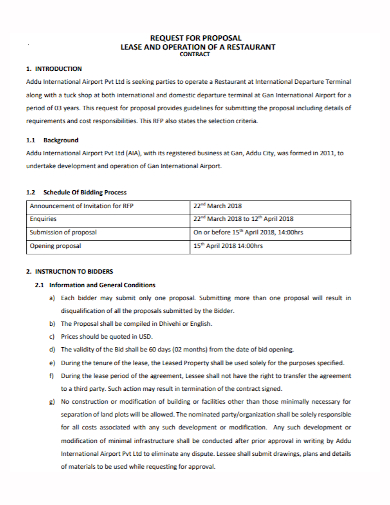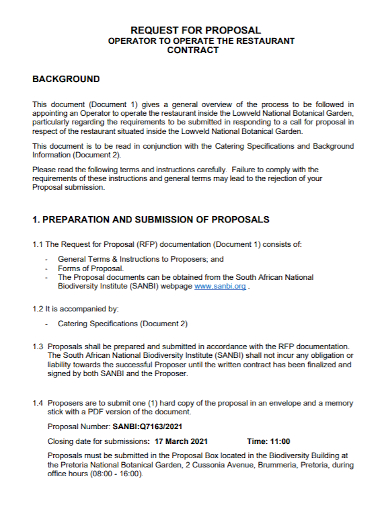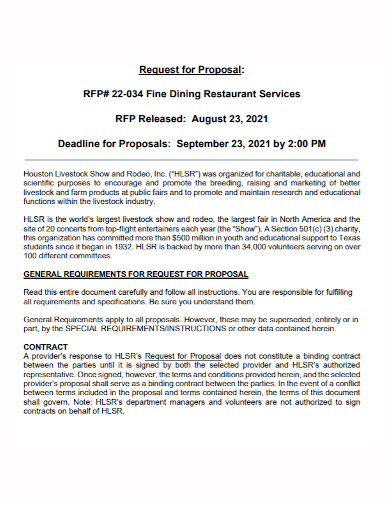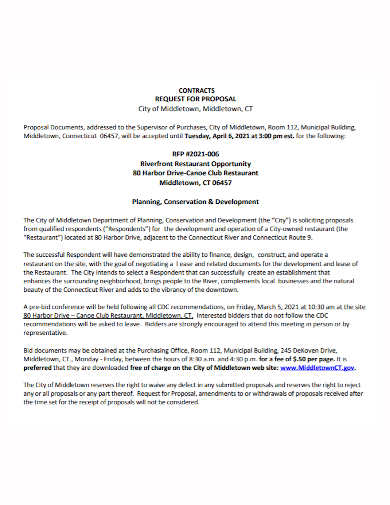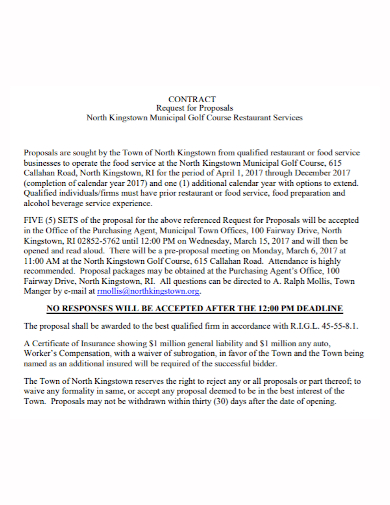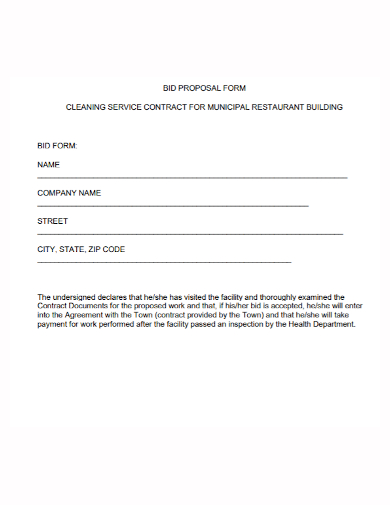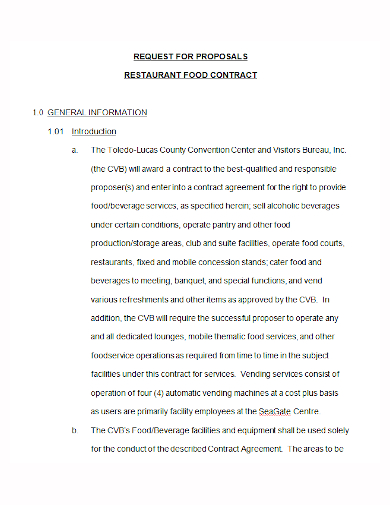Do you have a great idea for a restaurant that you just know is a winner? After deciding to make the leap into restaurant ownership, you’ll need to get investors, landlords, banks, and many others on board to bring it to life. This means it’s time for you to create your very own restaurant contract proposal. Creating a restaurant contract proposal is a big step and can seem daunting, but with the right advice and a few restaurant business plan examples, you can create your own.
7+ Restaurant Contract Proposal Samples
1. Restaurant Contract Proposal Template
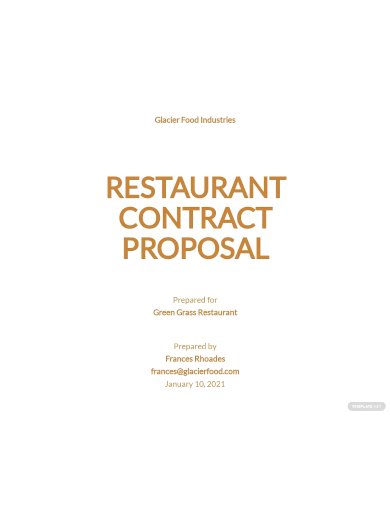
2. Restaurant Lease Contract Proposal
3. Restaurant Contract Proposal
4. Restaurant Services Contract Proposal
5. Restaurant Opportunity Contract Proposal
6. Restaurant Contract Services Request for Proposal
7. Restaurant Contract Bid Proposal
8. Restaurant Food Contract Proposal
How to Make a Restaurant Contract Proposal
Outline Your Proposal
Write the list of sections you will include in your proposal. Include the following sections: concept, market research, marketing plan, projections, startup costs, operating costs, budget, experience and support documents.
Describe Your Concept
Provide a description of your restaurant concept that goes beyond the cuisine and menu items. Discuss why this type of food will sell well in a specific geographic area to a specific audience. For example, you might be proposing a low-cost pizzeria in a college town that has only one other restaurant that sells pizza as part of its more expensive Italian sit-down menu.
Describe the Industry and Market
Outline your target audience, competition, pricing strategy and unique selling differential in your market research section. Demonstrate the demand in the marketplace for your restaurant and back it up with research and data.
Explain how you will market your restaurant. Include what type of media you will use, such as print, newspaper, radio, TV, websites, direct mail or social media sites. Explain why you have chosen your media, who it will reach and what the annual cost will be.
Calculate Financial Projections
Project your monthly and annual sales figures and annual profit projection. Provide projections for the first three years, which might include a loss for the first six months to one year, a period of breaking even and a profitability date. Give the date by which an investor will recoup his initial investment. Just because you reach profitability after one year does not mean the investor will make a profit, because that positive cash flow must first repay the initial startup costs.
Identify and List Startup Costs
List the startup costs, which include the expenses to open the restaurant and operate it until you reach the break-even point. Divide your expenses into food costs and non-food, or overhead, costs. Demonstrate that you have set your prices based on an analysis of your food costs, operating costs and profit margin. Include an annual master budget listing all of your expected expenses, by type and per month.
Compose Professional Biographies
Include biographies of all key owners, operators, staff members and consultants who will be part of the launch and operation of the business. Emphasize any restaurant experience these people have, and note any investment they are making in the company.
Provide a Summary
Summarize the report, including the requested funding. Do not provide detail or support in the summary, but simply recap the information you have presented, highlighting the demand in the marketplace for your concept, your ability to operate a restaurant and the projected profit potential.
Include an Appendix
Provide support documents in an appendix, which might include marketing, food or overhead budgets, menus, surveys or cash flow projections. Refer to the appendix in the main body of the proposal when you need to make an assertion but don’t want to provide detailed support with it.
Create a Cover Page
The cover page should include your contact information, a contents page and an executive summary, which will start the proposal. Keep the executive summary to approximately half a page, briefly describing the concept, financial projections, your expertise and the investment needed with no detail or support.
FAQs
How will a restaurateur makes their restaurant stand out?
- Participate in community events
- Make your location available for special events
- Offer cooking or mixology classes
- Host special meals or tastings related to seasons or holidays
- Get involved with a local charity
What is important in a restaurant?
A famous restaurant is known for its food, and great tasting food is a vital feature of a good restaurant. No matter what you do, if the food at your restaurant is not great, people will not return. This is why delicious food is a key element of a successful restaurant.
What are the three core elements of a successful restaurant?
- Customer Service + Staff: Diners expect a high level of service when they visit your restaurant and the only way to provide that is to make sure that your employees know their job, the menu items, their ingredients and preparation confidently.
- Food: One of the major keys to having a successful restaurant is to choose the right type of food, the quality of ingredients as well as how to present your dishes. From the beginning stages of your restaurant business you should hold your kitchen to consistent food preparation standards as well as find and partner with quality food suppliers.
- Marketing: Marketing comprises both branding and advertising. By solidifying your restaurants personality, mission and identity, you are building your brand. Advertising is the other side of the equation; this is how you communicate your restaurant’s brand to find new and returning customers.
Once you’re done drafting the contract, make sure to review it first and check to see if there are any errors or wrong information being input. Discuss it first with your client and reach a mutual agreement with the contents of the contract before signing it. To help you get started making the contract, download our free sample templates above to use as your guide!
Related Posts
Title Project Proposal Samples [ Community, School, Student ]
FREE 10+ Health Project Proposal Samples [ Public, Mental, Healthcare ]
FREE 11+ Engineering Project Proposal Samples in PDF | MS Word
FREE 4+ Racing Sponsorship Proposal Samples [ Team, Car, Driver ]
FREE 10+ Nursing Project Proposal Samples [ Community, Health, Clinical ]
FREE 11+ Student Council Proposal Samples in PDF | DOC
FREE 8+ Joint Venture Proposal Samples [ Commercial, Real Estate, Construction ]
FREE 10+ Scholarship Proposal Samples [ Project, Grant, Sponsorship ]
FREE 10+ Network Project Proposal Samples [ Design, Security, Bank ]
FREE 14+ Accounting Proposal Samples in PDF | MS Word
FREE 10+ Church Event Proposal Samples in MS Word | Google Docs | Apple Pages | PDF
FREE 10+ History Proposal Samples [ Dissertation, Thesis, Paper ]
FREE 34+ Sponsorship Proposal Samples in PDF | MS Word | Pages | Google Docs
FREE 11+ Cost Proposal Samples & Templates in PDF
FREE 11+ Maintenance Proposal Samples in MS Word | Google Docs | PDF

